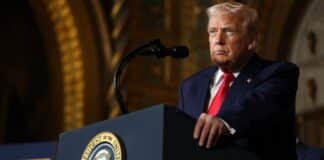The Taliban, the jihadist group ruling Afghanistan since 2021, is once again pushing for official recognition at the United Nations. This week, top Taliban diplomat Suhail Shaheen claimed that representation at the U.N. is both a “necessity and a right” for the so-called “Islamic Emirate of Afghanistan.” Despite controlling the country for nearly four years, the Taliban remains internationally unrecognized and continues to enforce an oppressive sharia regime.
Shaheen, who oversees the Taliban’s Qatar-based embassy, argued that U.N. participation would help resolve global issues involving Afghanistan. However, the group’s longstanding affiliation with terrorist organizations and its brutal domestic policies remain major roadblocks to legitimacy. No official U.N. member state has formally recognized the Taliban since it seized Kabul in August 2021, overthrowing the U.S.-backed Islamic Republic of Afghanistan.
Although the Taliban’s regime has not been granted full international status, rogue regimes such as Iran and China have engaged with the group diplomatically and economically. These nations have invested in Afghanistan’s natural resources, framing the Taliban as an “interim” authority. The Taliban now claims control of 39 diplomatic missions globally, slowly displacing representatives of the former Afghan government.
The United Nations has so far refused to seat Taliban envoys, instead maintaining ties with the deposed republic’s diplomats. However, the U.N. has opened indirect engagement through its Afghanistan office, UNAMA. Notably, the Taliban has been invited to U.N.-hosted events, including last year’s COP29 climate summit, raising concerns about creeping normalization.
In a controversial move, UNAMA is reportedly considering a “mosaic” framework that could grant the Taliban access to frozen Afghan assets, lift international sanctions, and potentially hand over Afghanistan’s U.N. seat. Human rights groups and Afghan exiles strongly oppose the plan, warning that it rewards extremist rule without requiring political reform or safeguarding civil liberties.
Current Afghan U.N. ambassador Nasir Ahmad Faiq condemned these efforts, stating that any attempt to normalize relations without transparency or reform “will not be acceptable to the Afghan people.” Yet, those same people live under a Taliban regime notorious for public executions, suppression of women, and banning of dissent.
The Taliban’s continued relationship with Al Qaeda remains one of the most damning reasons for its exclusion. U.S. intelligence confirmed that Al Qaeda leader Ayman al-Zawahiri was living openly in Kabul before being killed in a 2022 drone strike. He was reportedly protected by Sirajuddin Haqqani, a key Taliban figure with longstanding terrorist ties.
While the Biden administration’s chaotic withdrawal from Afghanistan handed the Taliban a cache of advanced U.S. military equipment, the regime’s stability is further propped up by aid and political support from authoritarian allies. Yet without real reforms or international accountability, calls for legitimizing the Taliban remain widely rejected on the global stage.





